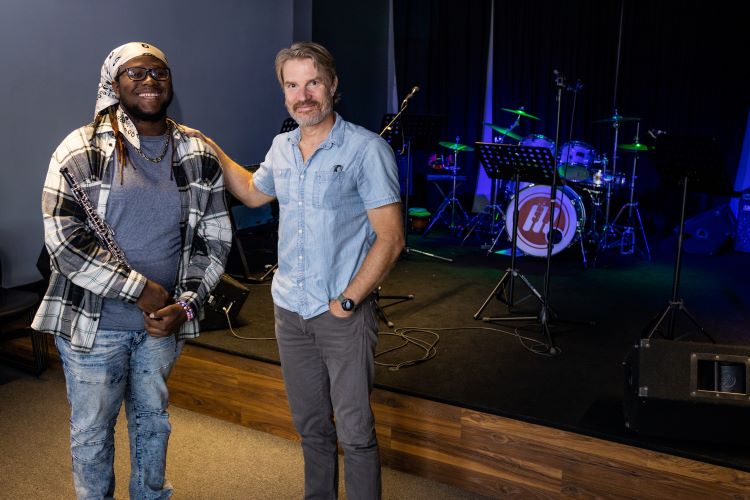UMKC Conservatory students benefit from family’s generous gifts
Katrinka Sizemore’s mother remembers that her daughter was so determined to play an instrument as a young child, that Katrinka convinced her aunt to give Katrinka her piano.
“We never had to encourage her to play,” Kathy Riggs says of she and her husband, James Riggs. “Music was her.”
In high school, Sizemore took oboe lessons, and her instructor told her she could compete at the state level.
”She used her independent study time in school to practice oboe. It was music, music, music with this child and we just watched from the sidelines.”
Sizemore attended UMKC and earned her B.A. in music in 2001; she graduated from the University of California – Los Angeles with a master’s in music in 2003.
As an adult, Katrinka married Aaron Sizemore, a musician who began playing professionally when he was 15 years old. They started Music House, School of Music in Overland Park, Kansas, for children to learn to play instruments and perform in a collaborative setting. Aaron and Katrinka believed that music is made to be shared and developed a teaching method they felt was more collaborative and avoided an arrogance that was sometimes present in music education.
“They sparked each other,” Riggs says.
The concept and business was a success from the start. In two years, they had 300 students. Currently Music House has three locations.
“Katrinka handled the business side, and she was inspired by the process,” Aaron says. “She was so smart and had so much grit and integrity.”
Katrinka was diagnosed with stage IV breast cancer when she was 30 years old.
“She approached it as a learning opportunity,” Sizemore says. “She continued to teach, and she wrote an oboe book. The doctors told her she had two years to live. She survived for seven.”
Aaron donated her oboe to UMKC, and with her parents established the Katrinka Marie Sizemore Music Scholarship to support students with financial need who are studying oboe performance. Katrinka’s lifelong friend, Megan Shumaker, makes regular contributions to the scholarship through the Shumaker Family Foundation.
“I knew Katrinka my whole life,” Shumaker says. “We were in cribs together. I thought a scholarship was a good way to remember her. Katrinka would have wanted something to help students go into the arts.”
Antwone Moore, a junior who is pursuing his bachelor’s degree in music education, is one student who has benefitted from Katrinka’s legacy. As with Katrinka, he is passionate about the oboe. He says that with the help of his 6th grade teacher, Bronwyn Short, “The oboe chose me.”
When he began to think about college, UMKC seemed to be the perfect fit. A Kansas City, Kansas native, he didn’t want to be too far from home, and he was comfortable at the university.
“I was familiar with the music department from being in the UMKC Conservatory Bridges program. After doing my research, I felt this was the right choice. I wanted my freedom,” he says. “But I didn’t want to be too far from home. The culture here is so nurturing.”
Celeste Johnson, associate professor of oboe, was an advocate for Moore’s receiving Katrinka’s oboe.
“I was thrilled that Antwone received this oboe – it could not go to a more deserving student. I am so happy that this generous donation makes it possible for a talented, hard-working student like Antwone to pursue his goals and dreams to become a music teacher.
Moore did not know that Johnson was working on his behalf, or that the gift of an oboe was even a possibility.
“I don’t talk about this often, but I come from a very low-income family and have never owned my own instrument. I almost broke down crying when I received the news that Professor Johnson had done this for me. I’m still careful when I play it. I want to do my best to do right by Katrinka and Aaron.”
“I think she’d be happy about the scholarship and the oboe donation,” Sizemore says. “As part of dealing with her mortality she became mindful of what really matters. Katrinka would appreciate Antwone having the oboe, and that the fund will affect a lot of people over time who may have missed the opportunity for education because they couldn’t afford it.”

